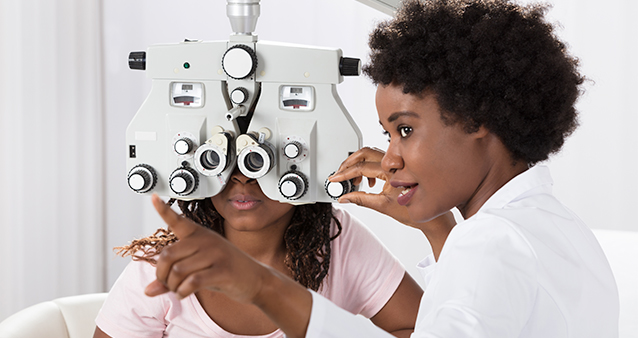Is it Time to Book an Eye Test?

Between screens, screens and more screens, your eye care is probably not at its best and are quietly taking a beating. Here's how to practise proper eye care for your baby blues, greens or browns.
Seeing spots? Maybe it's a sign that you need to pay attention to eye care or need to book an eye test at an optometrist... Our digital world may be the sign of rapidly advancing technology, but for many people it's also led to rapidly deteriorating eyesight. This is largely because of the infamous blue light these devices emit.
"Although blue light in itself is a natural phenomenon – it's present in daylight and helps us to stay awake – over-exposure can lead to eye strain, eye fatigue and sleeplessness due to its high intensity," explain the experts at global med-tech company Hoya Vision.
Common eye complaints of those who spend hours exposed to blue light (by which we mean "hours staring at a screen") include red, irritated, dry and tired eyes, blurred vision, sleeplessness and headaches from ongoing eye strain.
It's not only blue light that can hurt our eyes. Ultraviolet (UV) rays can also harm your peepers. Repeated and excessive exposure to the sun can damage various parts of the eye, including the cornea, lens and the surface tissues.
Over time, this increases the risk of eye cancer, cataracts (the clouding of the lens of your eye which leads to blurry vision), growths on or near the eye, and sunburned eyes (yes, it's a thing!). The latter can lead to a condition known as photokeratitis, the inflammation of the cornea.
Take Charge of Your Eye Care
Let's be honest, you're not going to be able to switch your screens off anytime soon. The remote working culture that's come out of the pandemic means we need to examine how we manage our screen time.
Hoya suggest the following ways to protect your eyes from blue light:
Spatial awareness: Keep your computer or laptop at arm's length, directly in front of your face and slightly below eye level. With smartphones and other handheld devices, it's also best to keep your distance and place them just below eye level.
Reduce the glare: From adjusting the brightness of your screen to keeping it clean, make sure the light in your eyes is not too bright.
Blink more: With the (frequent) blink of an eye, you can reduce the occurrence of dry eyes.
Take regular breaks: Looking away from your screen for 20 seconds every 20 minutes can make a significant difference.
Investigate special eyewear: Indoor lenses with anti-reflective coatings created for office and computer use offer wide and comfortable fields of vision at near and intermediate distances. Ask your optometrist for more information.
The Eye Test
Long-term eye damage can be devastating, but it's manageable if you catch it quickly. Your Medical Aid should cover the costs of an eye test (remember, it's also in your insurer's best interests for your eyes to stay healthy!).
"A comprehensive eye examination is not only to obtain a spectacle prescription," says Shana Cohen, an optometrist at Peers and Fisher Optometrists. "It's also an evaluation of ocular health to detect any pathology (disease). Some systemic diseases manifest in the eye and we can often detect these too. We assess all visual functioning, not just sight."
Translation: your eyes are the window to your soul... and to other aspects of your health. An eye test can pick up early signs of high blood pressure, high cholesterol, diabetes, and certain autoimmune diseases and cancers.
The eye exam is not just about reading tiny letters on a chart; expect several tests with nifty machines. They measure everything from how light is affected as it reflects through your eyeball, to determining your risk of glaucoma by blowing air onto the surface of each eye to measure internal fluid pressure. Your visit to an optometrist can also help you get a referral to an ophthalmologist near you if one is needed.
To make sure you're covered for any eye-related medical costs, find the best Medical Aid or medical policy to meet your needs. Use our online tool to compare Medical Aid quotes.
This article is for informational purposes only and should not be construed as financial, legal or medical advice.
Hippo Blog Categories

































